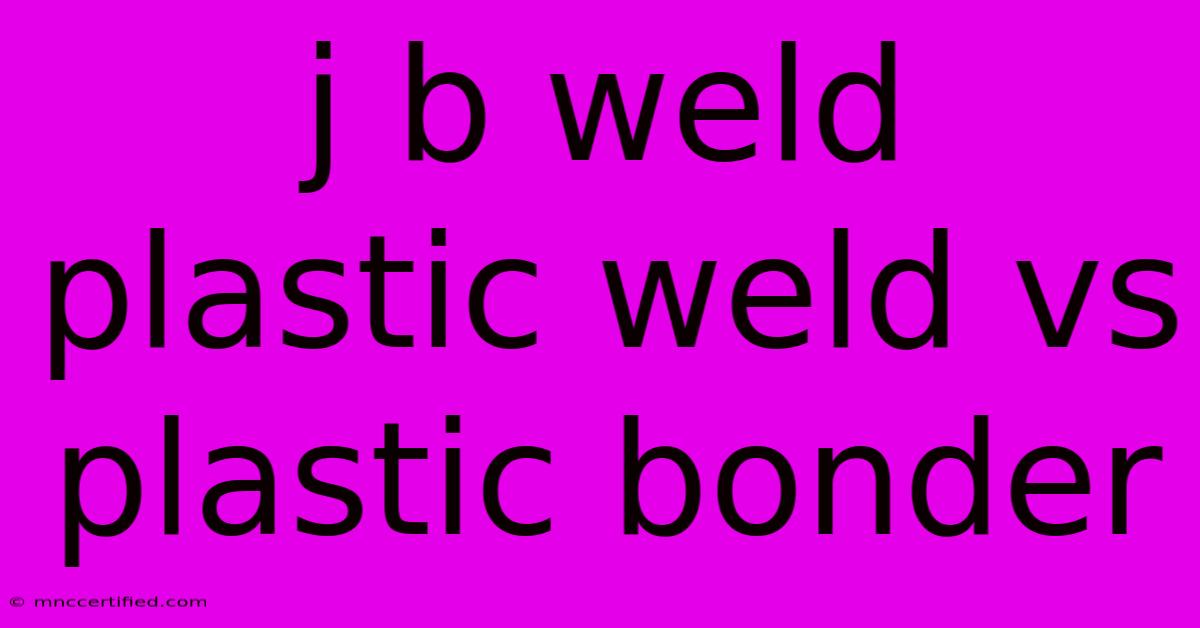J B Weld Plastic Weld Vs Plastic Bonder

Table of Contents
JB Weld Plastic Weld vs. Plastic Bonder: Which One is Right for You?
When faced with a broken plastic item, many turn to adhesives for a quick fix. Two popular options are JB Weld Plastic Weld and plastic bonders. Both offer strong bonding capabilities, but they have distinct differences that make one a better choice for certain applications. This guide will delve into the pros and cons of each product, helping you make an informed decision for your next plastic repair project.
What is JB Weld Plastic Weld?
JB Weld Plastic Weld is a two-part epoxy designed specifically for repairing plastics. It boasts a strong, durable bond that can withstand high temperatures and chemicals, making it ideal for repairs that need to hold up under stress. Its unique formula is compatible with a wide range of plastics, including ABS, PVC, polycarbonate, and fiberglass.
What is a Plastic Bonder?
Plastic bonders are a diverse group of adhesives that come in various forms like liquid, gel, or tape. They typically use cyanoacrylate (superglue) or polyurethane-based formulas. While some offer decent bonding strength, they generally aren't as robust as JB Weld Plastic Weld.
Comparing the Two: Key Differences
Here's a table outlining the key differences between JB Weld Plastic Weld and plastic bonders:
| Feature | JB Weld Plastic Weld | Plastic Bonder |
|---|---|---|
| Type | Two-part epoxy | Various types |
| Bond Strength | Very strong | Moderate to strong |
| Cure Time | Longer | Fast |
| Flexibility | Less | More |
| Heat Resistance | High | Moderate |
| Chemical Resistance | High | Moderate |
| Cost | Higher | Lower |
Pros of JB Weld Plastic Weld:
- Exceptional Bond Strength: JB Weld Plastic Weld is known for its exceptional bond strength, making it suitable for repairs that will endure high stress.
- Excellent Heat and Chemical Resistance: This product can withstand high temperatures and harsh chemicals, making it ideal for repairs on items exposed to extreme conditions.
- Wide Compatibility: It works on a variety of plastics, including ABS, PVC, polycarbonate, and fiberglass.
Cons of JB Weld Plastic Weld:
- Longer Cure Time: It takes longer to cure compared to some plastic bonders, requiring a significant wait time for full functionality.
- Less Flexibility: The hardened epoxy is less flexible than other options, which can limit its use in applications requiring a certain degree of bendability.
- Higher Cost: It's typically more expensive than basic plastic bonders.
Pros of Plastic Bonder:
- Faster Cure Time: Many plastic bonders offer fast curing times, allowing you to use the repaired item quickly.
- More Flexibility: Depending on the formula, some plastic bonders offer greater flexibility than epoxy, making them suitable for repairs that might need to bend.
- Lower Cost: Plastic bonders are generally more affordable than JB Weld Plastic Weld.
Cons of Plastic Bonder:
- Lower Bond Strength: The bond strength can be significantly lower than that of JB Weld Plastic Weld, making it less suitable for high-stress repairs.
- Limited Heat and Chemical Resistance: Plastic bonders generally have lower heat and chemical resistance compared to JB Weld Plastic Weld.
- Compatibility Issues: Some plastic bonders may not be compatible with all types of plastics, so it's essential to check the product label.
Choosing the Right Option
The best option for you depends on your specific needs:
- For strong, durable repairs that need to withstand high stress, heat, and chemicals, JB Weld Plastic Weld is the better choice.
- For quick and easy fixes where strength isn't a primary concern, a plastic bonder might be sufficient.
In summary, both JB Weld Plastic Weld and plastic bonders are valuable tools for repairing plastic items. By understanding their strengths and limitations, you can select the best option for your project, ensuring a lasting and reliable repair.

Thank you for visiting our website wich cover about J B Weld Plastic Weld Vs Plastic Bonder. We hope the information provided has been useful to you. Feel free to contact us if you have any questions or need further assistance. See you next time and dont miss to bookmark.
Featured Posts
-
Susie Wiles Trumps New Chief Of Staff
Nov 08, 2024
-
Universal North America Insurance Rating
Nov 08, 2024
-
Bank Of England Rate Cut Lower Mortgages
Nov 08, 2024
-
Assemble Protocol Price Prediction 2025
Nov 08, 2024
-
Oral Surgery Covered By Health Insurance
Nov 08, 2024